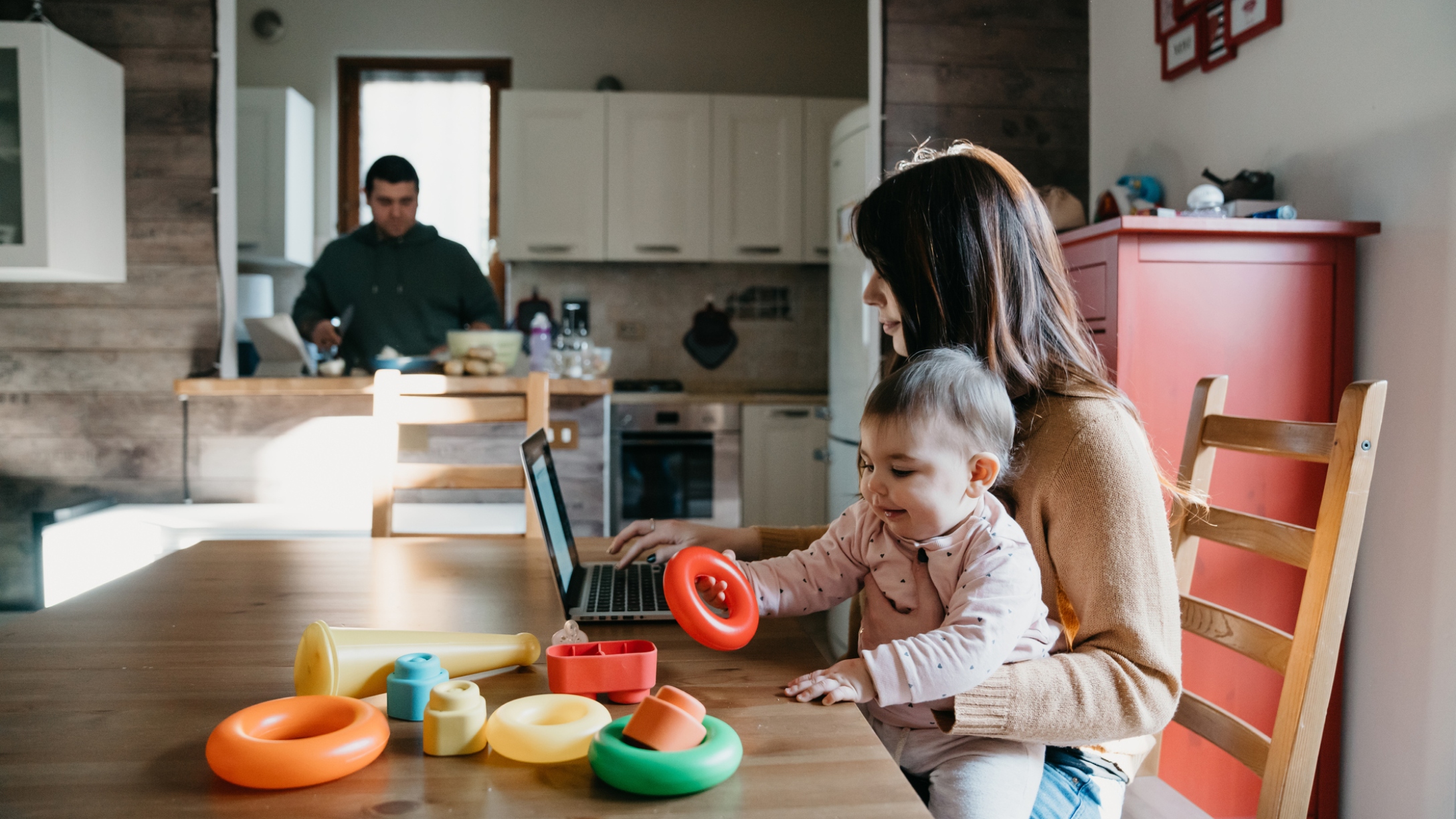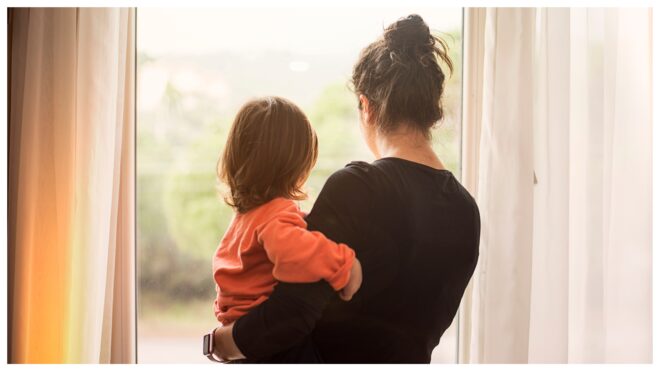
Many parents in the United States and around the world have been working from home since around March 2020, when it became clear that the health crisis was going to be a truly global problem. Most people who have the option to work remotely took it, but without any training, experience, or know-how that could prepare them for what it's like to work from home while also balancing feeding, cleaning, organizing, and educating your own kids.
As a parent who has been working from home the entire 11 years (almost 12) my child has been alive, I was definitely a little more prepared than most for this new reality. But even though I've "worked from home" all that time, I haven't usually done most of my work actually at my home — that's what coffee shops and cafés were for!
It's completely understandable if you're still struggling to balance work-from-home life with raising kids mostly at home, too. Here are things that have worked for me.
Here's the first thing you need to know: It's basically impossible.
It might not look like it from the outside, but I can almost guarantee that every single inspirational mom account you follow online is run by a woman who is flat-out exhausted at the end of each day. While I have developed a pretty solid rhythm to my work-from-home mom life nearly 12 years into it, I am still regularly daunted and knocked out by the sheer weight of all the responsibilities that come with it.
In other words: Working from home as a parent is very nearly impossible. Got it. But we all have to do it anyway, so how do we make it work?
Be nice to yourself.
One of the first things you have to do is stop expecting that you are going to be able to give 100% to everything that you feel like you owe that much to. In a dream world, we would be able to be 100% the best worker, parent, partner, chef, teacher, and so on. We would be able to do everything that everyone demands of us perfectly and in exactly the way they need it.
But the reality is that absolutely no one can live that way! It's not possible. We might be more than 10 months into a global health crisis, but a lot of employers are still expecting the same level of work they received before the crisis ever existed. Our kids are still trying to figure out how to even make remote learning work, or they're back in person at school and scared they're going to get sick. We still, somehow, for some reason, have to eat regular meals and — even worse — so do our kids! If you add a partner to the mix, you might as well just spend most of your time alternating between laughing and crying.
You already are, right?
So step one: Be nice to you! Don't beat yourself up for not meeting a standard that was never possible in the first place. I mean, I know that's easier said than done — I am still upset at myself for hurting my son's feelings like one time six years ago — but it's a necessary must. Even with all the promising news about vaccines and health advances, we are probably going to have to wrestle with this virus for quite some time. The best thing we can do for ourselves is to really, truly believe we are probably going to fail more times than we will succeed.
Take care of your needs first.
The second thing you absolutely have to do? Whenever possible, take care of your needs first. I know that's not always easy, especially when you have a young child or multiple kids in the house, but it's crucial to everyone's well-being and survival.
Jessica, a nurse and mom of two in Tennessee, echoes this advice. She told me, "If I could sum up anything I've figured out, I'd say the most important thing you could do is take care of your biggest needs as a human first, or you'll never get it done — coffee, meals, and five-minute sanity breaks."
Outsource some of your parenting to ... your other kids.
OK, OK, hear me out: I know some of you read that and balked immediately. I know that it's not the job of your older children to take care of your younger children. But I also believe that a family is a team, and that each team member has their roles to play, and those roles will shift and change as kids get older.
In other words, it's totally fine and even natural for older children to take over some of the care of their younger siblings, especially in challenging times like these.

Jessica says it's working for her: "If you can have an older child quiz a younger one, do it! Maximize the learning on both parts in this way. Have them read to each other."
Make peace with screens.
There seem to be three big ways of life happening right now for families:
- Kids are attending school in person.
- Kids are enrolled in distance learning through the school they would be attending.
- Kids are homeschooled independently of a school system.
My son falls in the latter camp. We've been homeschooling for several years, and while our homeschooling typically includes a lot more time out of the house, it was pretty easy to adapt. This isn't true for families who have had their children attending school outside the house, and the increased screen time that's become a staple of raising kids during a health crisis is worrying a lot of people.
While there are some who will make you feel bad about your kids spending extra time on screens these days, I think too many people are overlooking the fact that our kids have been hit with a lot of sudden changes, too. One day they were able to freely go to activities, play soccer and do dance, see their friends, and even go to school … and then all of a sudden, they weren't.
So some kids are using extra screen time as a way to unwind from the general stress that's all around them — and I fully get that. I also use TV this way. Other kids are using extra screen time as literally their only way to stay in touch with other kids. Still others are coming home from spending six, seven, or eight hours at school, where they wear masks all day and their teachers are lecturing behind plastic shields, and they are using extra screen time just to have a way to reset their minds. It's all valid. It's all OK.
Yes, too much screen time can cause some issues, including poor posture, neck pain, and eye strain. The solution in my household has been to set clear times for screen time, and to insist on moving our bodies in different ways when screen time isn't allowed.
Here's how it is supposed to work in my house: On any given day, my homeschooled kid has one to two hours of online classes that basically have him just sitting at his desk and working. During the week, he has free rein with screens from 2 p.m. to 5 p.m. He spends an hour of that time playing a video game with his best friend. Some nights, we watch TV together after dinner, and some nights we don't.
That sounds cute, right? So organized and A-OK. Three hours isn't too awful, especially since it's social. But the reality is that he somehow often ends up on a device way, way more than he should be, because on those days I start my work day around 7 a.m. and end it at 5 p.m. While I have more freedom to take breaks, to work at my own pace, and to generally figure out my time, it's still true that the work has to happen, and it has to happen whether or not my kid is also talking to me about Zelda: Breath of the Wild for two hours straight.
I used to get really worried, upset, or even frustrated about his screen time. Now I'm just making peace with all of it. This time isn't forever; he will probably not enter adulthood with his face buried in a phone 24/7. Probably.
Aaron, a dad in New York, has kids enrolled in school in person right now. He says he's trying to keep screen time in check, to a degree:
"I try to have my kids eschew screen time after school until the sun goes down. They can read, draw, play board games, etc., and then socialize with their friends online after sundown. They seem to think this is fair."







